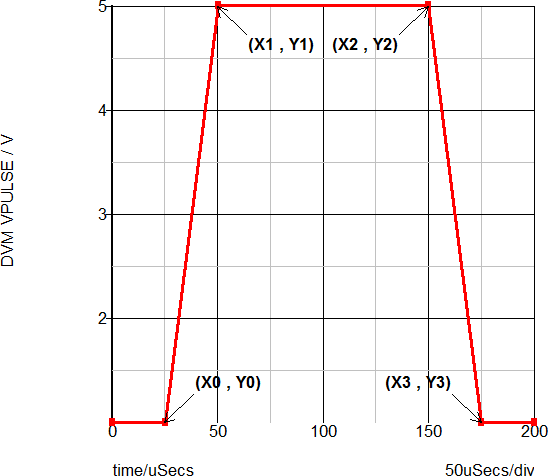Pulse Input Source - Single Pulse
The pulse input source can be configured to pulse the input voltage between two or three voltages. This source is used in the PulseLine() Test Objective.
Other similar sources include:
- Ramp Input Source - used when a single step or ramped voltage is required
- Pulse Source - Single Pulse w/ Exponential Decay - a single pulse with exponential rise and fall waveforms
- Pulse Source - Repeating Pulse - a repeating pulse with defined duty cycle and rise/fall times
- Pulse Source - Repeating Pulse w/ Zero Rise and Fall Times - a repeating pulse with zero rise and fall times
In this topic:
| Model Name | Pulse Input Source | |
| Simulator |

|
This device is compatible with both the SIMetrix and SIMPLIS simulators. |
| Parts Selector Menu Location |
||
| Symbol Library | None - the symbol is automatically generated when placed or edited. | |
| Model File | SIMPLIS_DVM_ADVANCED.lb | |
| Subcircuit Name | SIMPLIS_DVM_ADVANCED_SOURCE_PULSE | |
| Symbols |

|
|
| Schematic |

|
|
Pulse Input Source Parameters
The following table explains the relevant parameters.
| Parameter Name | Default | Data Type | Range | Units | Parameter Description |
| FALL_TIME | 50u | Real | min: 0 | s | The fall time of the source |
| FINAL_VOLTAGE | 12 | Real | V | The final voltage of the source | |
| PULSE_VOLTAGE | 9 | Real | V | The pulse voltage of the source | |
| PULSE_WIDTH | 200u | Real | min: 0 | s | The time which the source voltage is the PULSE_VOLTAGE |
| RISE_TIME | 100u | Real | min: 0 | s | The pulse rise time in seconds |
| SOURCE_NAME | SRC | String | n/a | n/a | Name of the DVM source. This name cannot contain spaces. |
| SOURCE_RESISTANCE | 0.4 | Real | min:0 | Ω | Sets the source resistance of the source |
| START_VOLTAGE | 5 | Real | V | The starting voltage for the source | |
| TIME_DELAY | 10u | Real | min: 0 | s | The time delay before the pulse initiates |
Testplan Entry for the Pulse Input Source
To set any managed DVM source to a Pulse Input Source subcircuit, place a Pulse testplan entry in the Source column.
The Pulse() testplan entry has the following syntax with the arguments explained in the table below.
Pulse(REF, START_VOLTAGE, PULSE_VOLTAGE, FINAL_VOLTAGE) Pulse(REF, START_VOLTAGE, PULSE_VOLTAGE, FINAL_VOLTAGE, OPTIONAL_PARAMETER_STRING)
where:
| Argument | Range | Description |
| REF | n/a | The actual reference designator of the DVM source or the more generic syntax of INPUT:n where n is an integer indicating a position in the list of DVM sources. |
| START_VOLTAGE | min: 0 | The starting voltage for the source. This can be a numeric value or a symbolic value, such as a percentage of the nominal source voltage. |
| PULSE_VOLTAGE | min: 0 | The pulse voltage for the source. This can be a numeric value or a symbolic value, such as a percentage of the nominal source voltage. |
| FINAL_VOLTAGE | min: 0 | The final voltage for the source. This can be a numeric value or a symbolic value, such as a percentage of the nominal source voltage. |
| OPTIONAL_PARAMETER_STRING | n/a |
Parameter string with a combination of one or more timing parameters:
|
* If more than one parameter is specified, join the parameter key-value pairs with a space, as shown in the example below. The order of the parameter names does not matter.
Timing
The timing for the Pulse Source is determined by the following parameters.
- TIME_DELAY
- RISE_TIME
- PULSE_WIDTH
- FALL_TIME
Timing parameters can be assigned using the optional parameter string as shown in the following examples.
Symmetric Pulse Example
This example shows a symmetric pulse with equal rise and fall times. The final voltage is the same as the starting voltage.
p>| *?@ Source |
|---|
| Pulse(INPUT:1, 1, 5, 1, TIME_DELAY=25u RISE_TIME=25u PULSE_WIDTH=100u FALL_TIME=25u) |
The results of this testplan entry are shown below:

| Annotation | Value |
| X0 | TIME_DELAY |
| X1 | TIME_DELAY + RISE_TIME |
| X2 | TIME_DELAY + RISE_TIME + PULSE_WIDTH |
| X3 | TIME_DELAY + RISE_TIME + PULSE_WIDTH + FALL_TIME |
| Y0 | START_VOLTAGE |
| Y1 | PULSE_VOLTAGE |
| Y2 | PULSE_VOLTAGE |
| Y3 | FINAL_VOLTAGE |
Asymmetric Pulse Example
The following example sets the first DVM managed source to a Pulse Voltage Source, with a starting voltage of 1V, a pulse voltage of 5V and a final voltage of 4.5V. Note the rise and fall times are not the same and the pulse does not have to return to the starting voltage value.
| *?@ Source |
|---|
| Pulse(INPUT:1, 1, 5, 4.5, TIME_DELAY=25u RISE_TIME=25u PULSE_WIDTH=75u FALL_TIME=50u) |
The results of this testplan entry are shown below:

| Annotation | Value |
| X0 | TIME_DELAY |
| X1 | TIME_DELAY + RISE_TIME |
| X2 | TIME_DELAY + RISE_TIME + PULSE_WIDTH |
| X3 | TIME_DELAY + RISE_TIME + PULSE_WIDTH + FALL_TIME |
| Y0 | START_VOLTAGE |
| Y1 | PULSE_VOLTAGE |
| Y2 | PULSE_VOLTAGE |
| Y3 | FINAL_VOLTAGE |